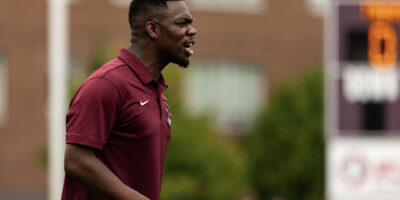
Over the past five years, family has become the foundation on which James Hatley has built his volunteer journey.
Currently, that means that the Hatley family’s Thursday night plans include volunteering with Special Olympics Saskatchewan’s floor hockey team, for which Hatley’s youngest son, Lucas, plays.
Hatley’s first two years with Special Olympics were spent volunteering in other roles, until the program required an individual to take on the task of growing the floor hockey team.
Suddenly, Hatley was at the helm of his son’s team as head coach.
“In my life I take on some different leadership roles and I wasn’t expecting to be a head coach of a floor hockey program, but there was a need to establish and grow the team,” shared Hatley.
As head coach, he addressed the program’s low attendance following COVID-19. The competitive and recreational teams were too small to compete individually, so Hatley unified the two into a single team.
The newly revived team was finally able to compete and in February 2024, the team attended a hockey tournament in Prince Albert and brought home silver under Hatley ‘s guidance.
In recognition of his efforts, Special Olympics Saskatchewan named Hatley as a recipient of their Coach of the Year Award in 2024.
But Hatley’s work has just begun.
“I’m really looking to develop more youth coaches and in fact, we now have three youth coaches that are doing really well. I would love for them to actually take over the program at some point,” said Hatley. “They can help grow and expand the program, bring in new ideas, new energy.”
The additional assistance in drill development has been beneficial in all areas of team development, including Hatley, who has been just as inspired by the young coaches.
And although Hatley has become a mentor to many, his eldest son, Connor, who currently helps as assistant coach, has become a major inspiration to him as head coach.
“He has shown me and taught me quite a few skills in working with the athletes. He had a career in hockey, but his ability to work with the individual athletes and understand where they currently are in skill level and what their needs are for skill development is quite good. But then also, he is able to just inspire them and challenge them to do the best that they can.”
Although becoming head coach was not his initial intention when first joining as a volunteer, Hatley claims that it quickly became a rewarding experience and during his years in the role, his family has continued to grow.
“I always find that the Special Olympics athletes become an extended part of our family.”



